|
2 Tothill Street
High Street
Minster
01834 826142
https://whatpub.com/new-inn
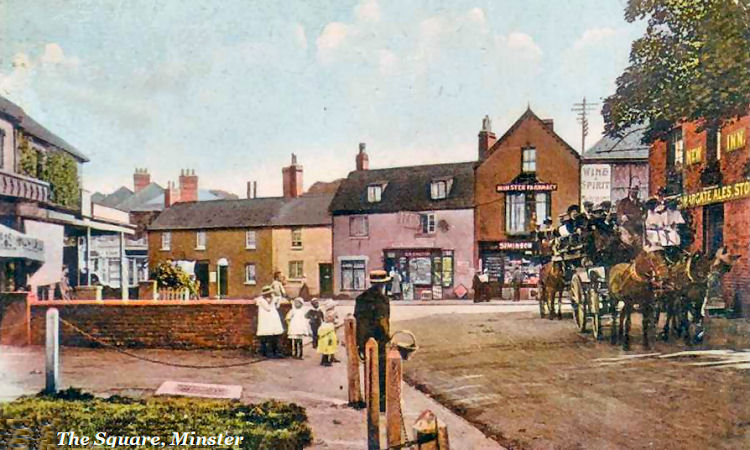
Above postcard circa 1903. Kindly sent by Rory Kehoe. |
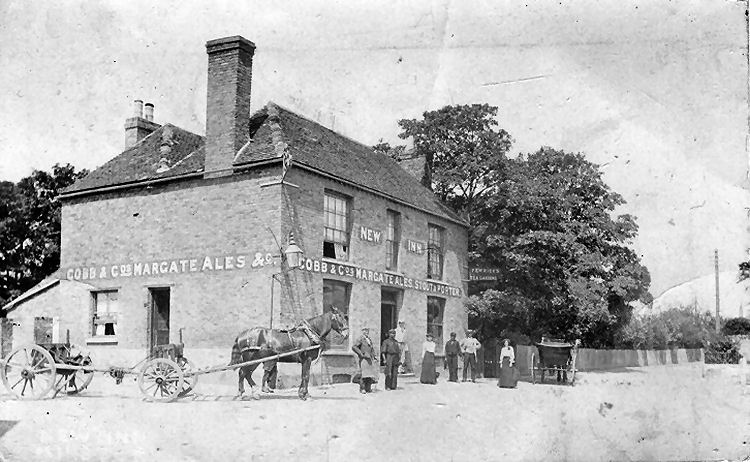
Above postcard, 1905. Kindly sent by Rory Kehoe. |
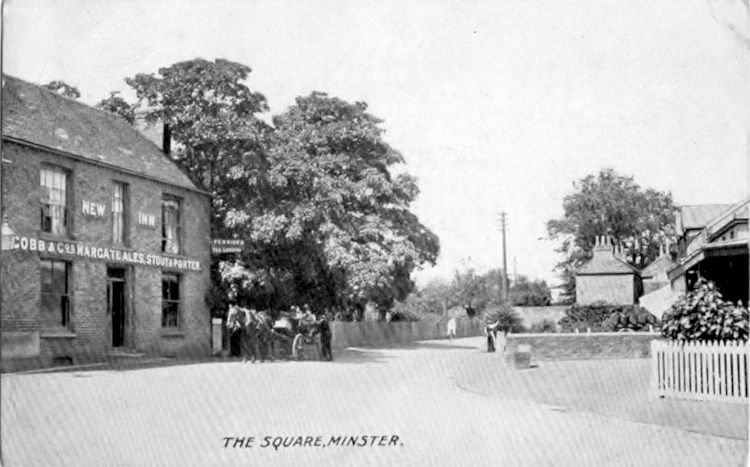
Above postcard, date unknown. |
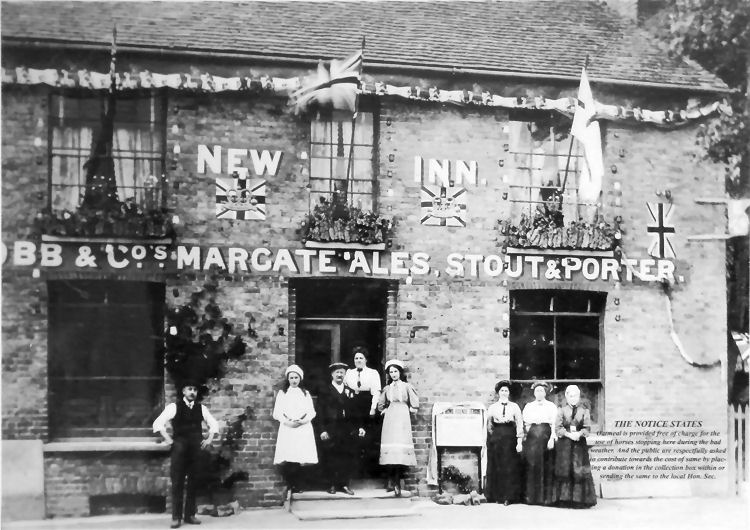
The notice states:- Oatmeal is provided free of charge for the use of
horses stopping here during the bad weather. And the public are
respectfully asked to contribute towards the cost of same by placing a
donation in the collection box within or sending the same to the local
Hon. Sec.
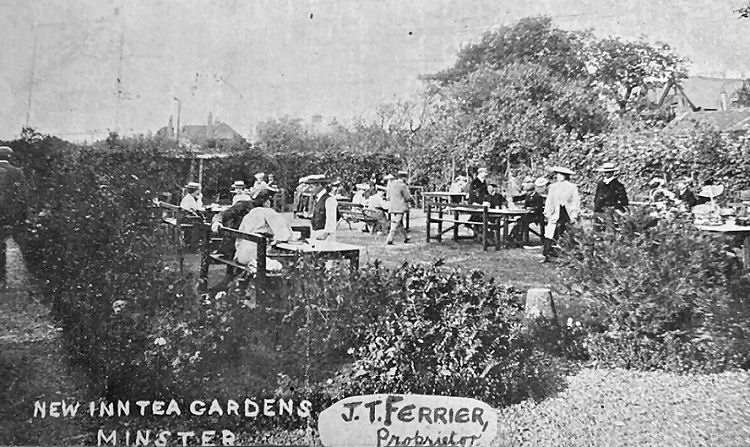
Above picture Tea Gardens of the "New Inn." 1907.
|
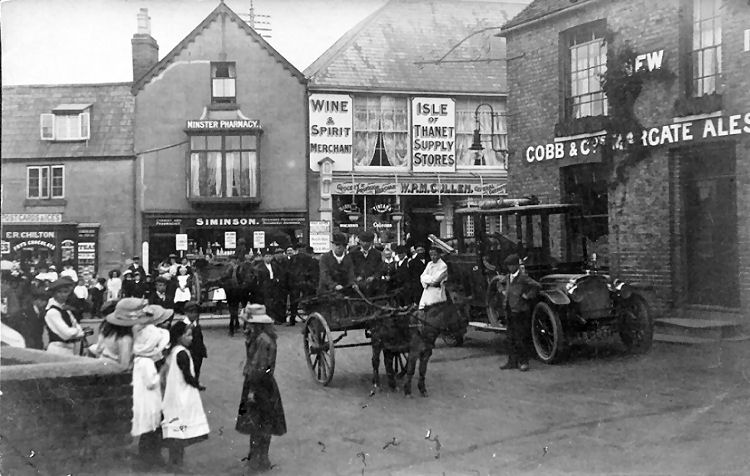
Above postcard, 1908. Kindly sent by Rory Kehoe. |
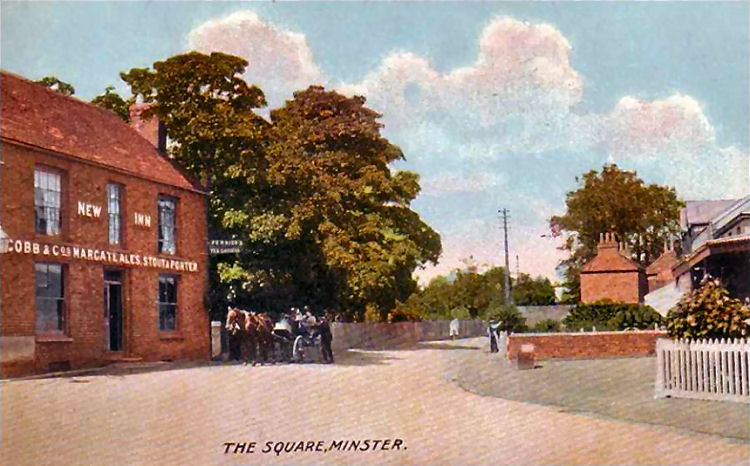
Above postcard circa 1909. Kindly sent by Rory Kehoe. |

Above postcard, postmarked 1909, kindly sent by Rory Kehoe. Shown in the
livery of Cobb & Co's Margate Brewery. Interesting to note the wall sign
advertising Easton's Tea Gardens. Was Joseph Easton licensee before
1911, or did he have the concession for providing garden teas to
day-trippers prior to this? Several horse-drawn charabancs outside the
pub, so it's fair to think that business in the garden was brisk. The
card was postmarked August 1909, so well before the 1911 date Easton is
thought to have become licensee. |
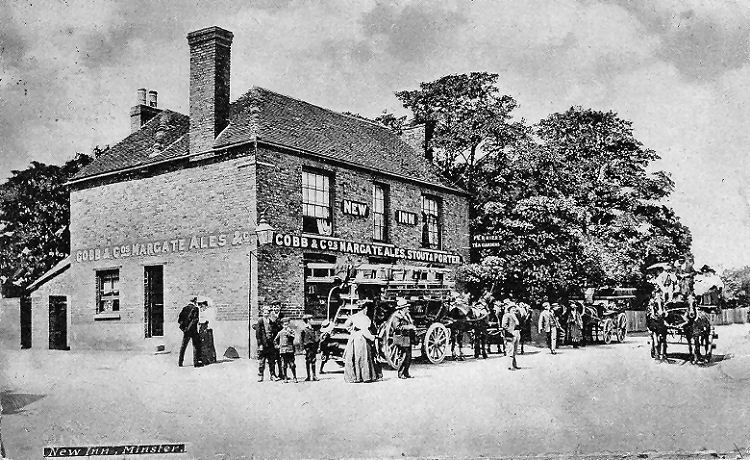
Above postcard, 1910. Kindly sent by Rory Kehoe. |
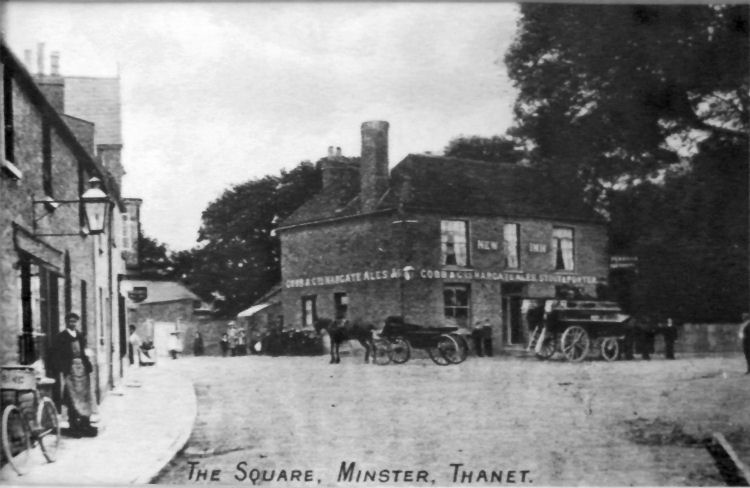
All pictures above by kind permission of the "New Inn" circa 1910.
|
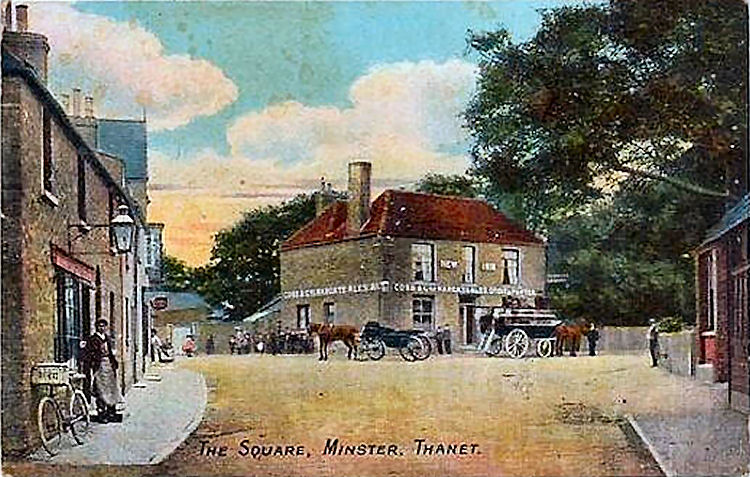
Above postcard, dated 1910. This is obviously a hand coloured version of
the photograph above. |

Above postcard, 1910, kindly sent by Rory Kehoe. |

Above postcard, circa 1910, kindly sent by Rory Kehoe. |
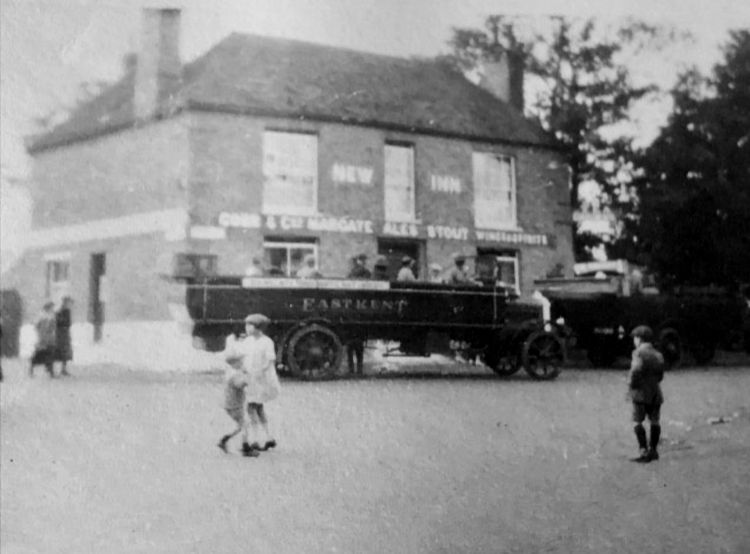
Above photo circa 1922, kindly sent by Rory Kehoe, with thanks to Keith
"Dicky" Daniel.
An East Kent Road Car Company charabanc sitting outside the pub
having, presumably, delivered a load of day-trippers to the pub's
popular beer garden. |
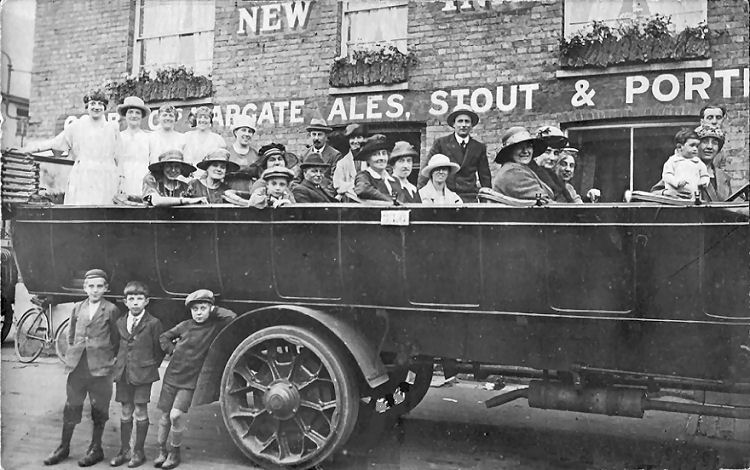
Above postcard, circa 1922, kindly sent by Rory Kehoe. |
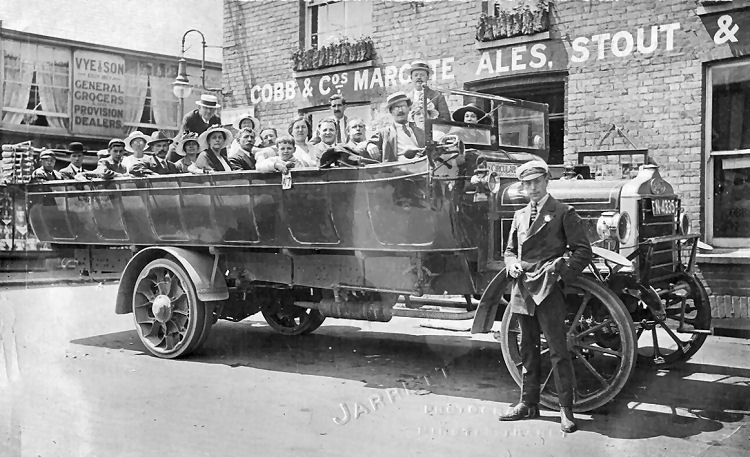
Above photo, circa 1922, kindly sent by Rory Kehoe. |
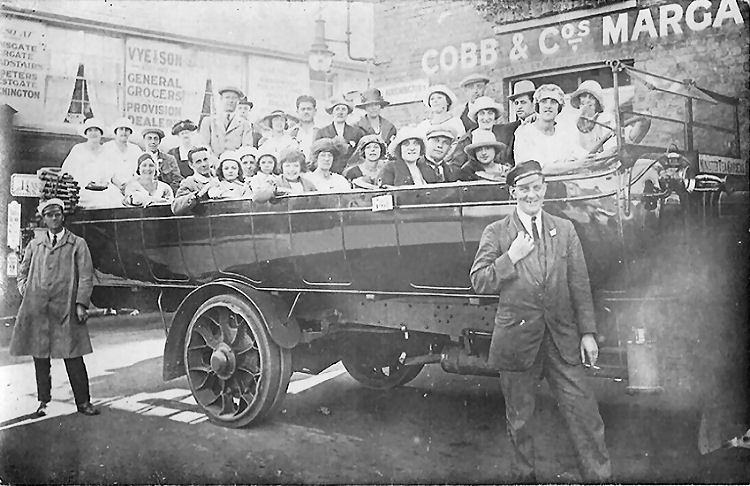
Above photo, circa 1923, kindly sent by Rory Kehoe. |
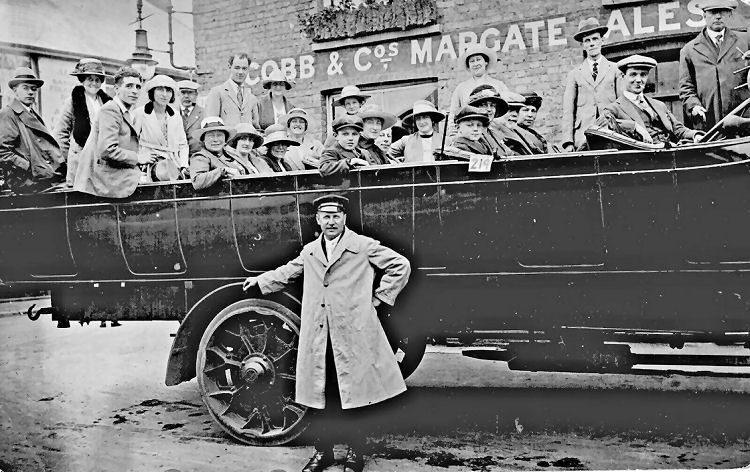
Above photo, circa 1923. Kindly sent by Rory Kehoe. |
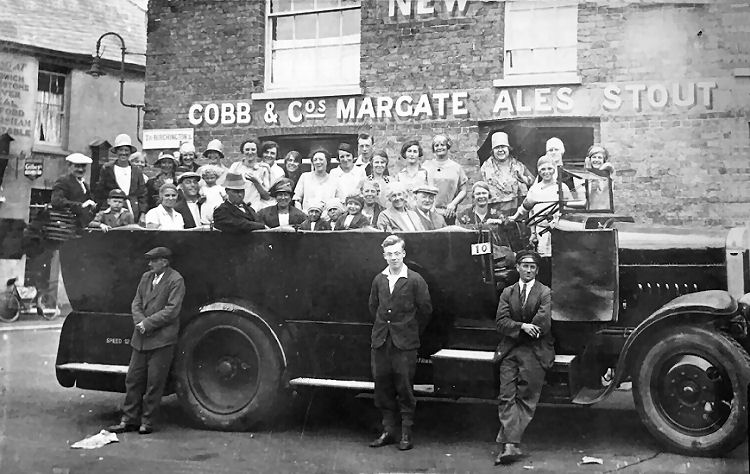
Above photo, circa 1926, kindly sent by Rory Kehoe. |
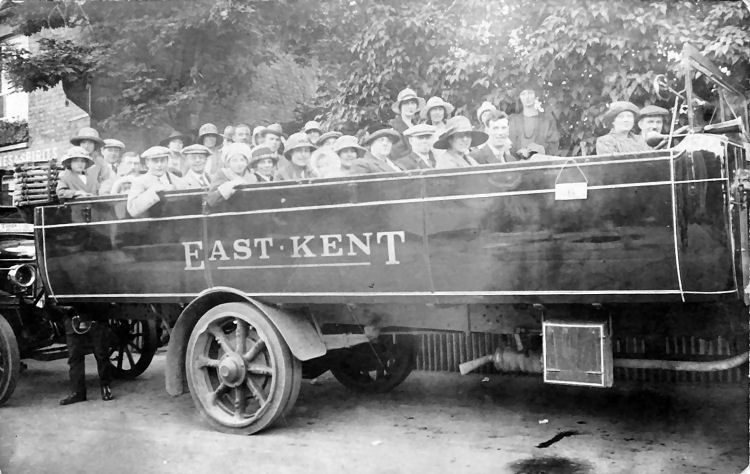
Above photo, 1930, kindly sent by Rory Kehoe. |
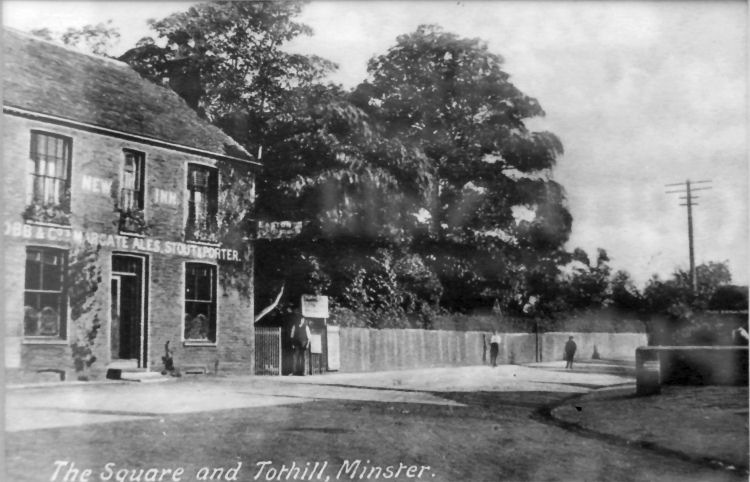
Above postcard, date unknown. |
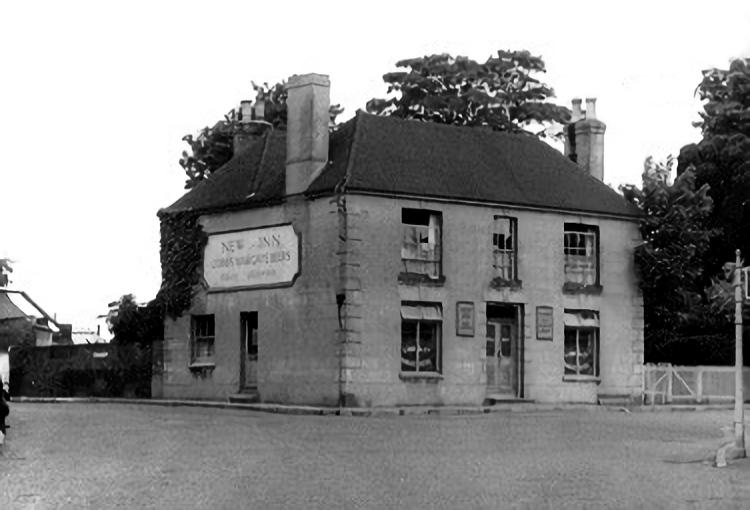
Above photo 1955. |
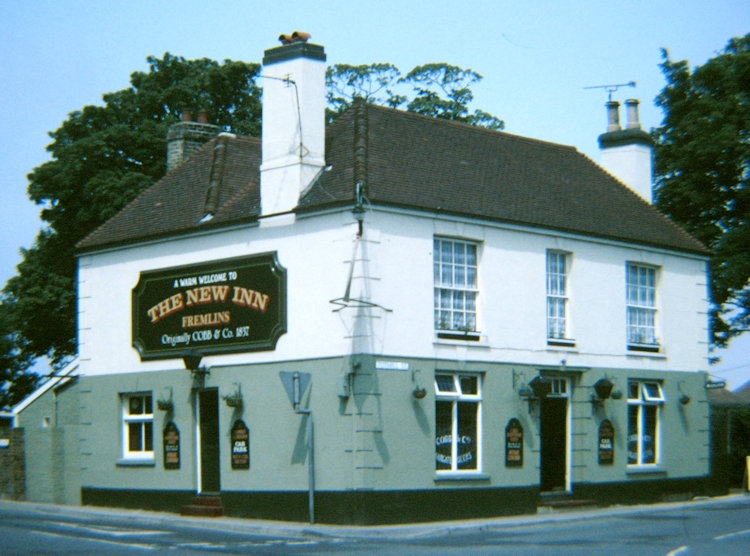
Above photo, 25 May 1987, by Jim Ashby. |

Above photo by Paul Skelton 4 July 2012. |
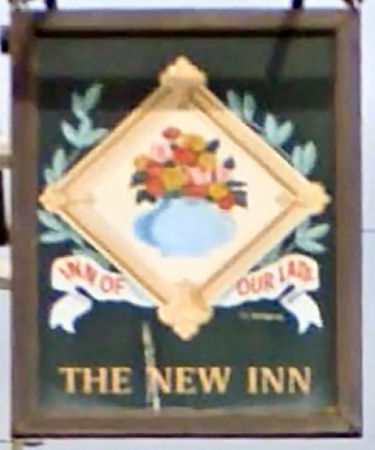 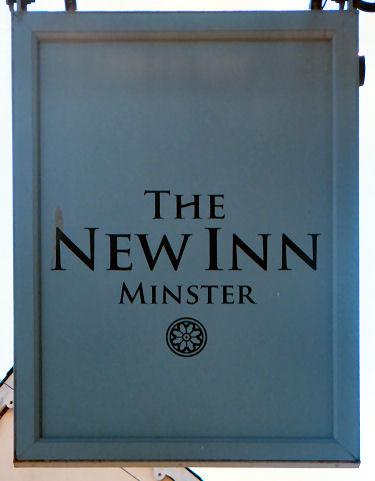
Sign left pre 2012, sign right photographed by Paul Skelton 4 July 2012. |
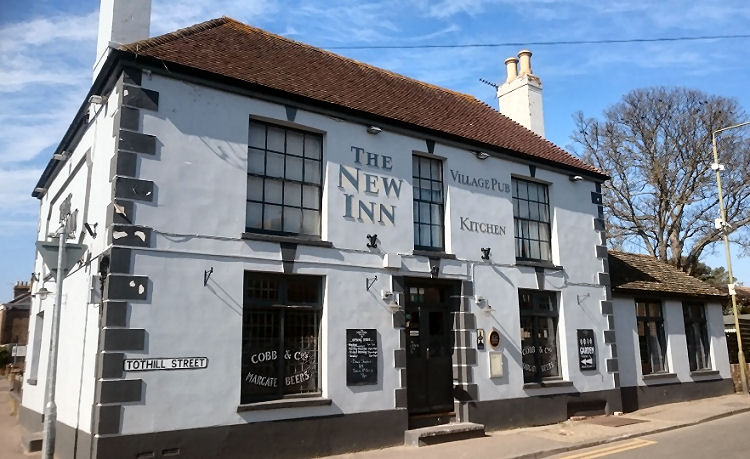
Above photograph, March 2019, kindly taken and sent by Rory Kehoe. |
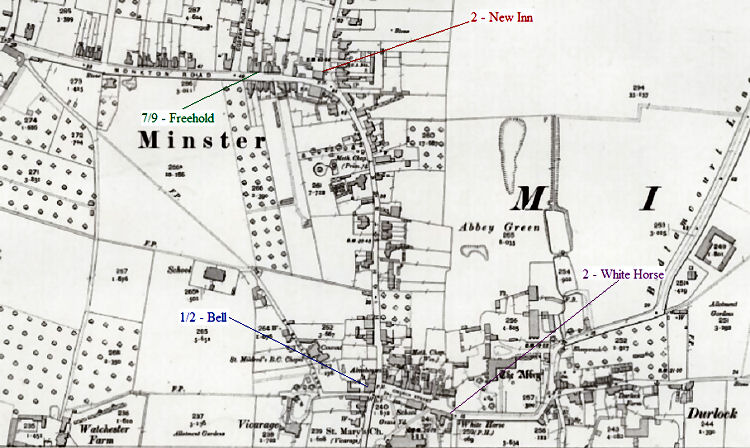
Above map 1905, kindly identified by Rory Kehoe. |
|
|
Found in Bagshaw Directory 1847.
In 1934 their telephone number was 28.
One time Cobbs tied house. Cobbs were founded in 1673, but Whitbread took
them over early 1968 and closed the brewery later that year.
|
From information viewed inside the New Inn.
THE NEW INN MINSTER
if you spot a pub called the "New Inn", don't be misled, for it is
invariably the modern replacement of an ancient hostelry. Minster's
"new Inn" is no exception. It was rebuilt in 1837, when its landlord was
Edward Buddell and it was with Edward's father William that the story
began. William Buddell was that special combination if innkeeper and
showman so peculiar to the early 19th century. he was landlord of the
18th century "Thatched House," the forerunner of the "New Inn." A
enterprising man, he discerned that Minster was becoming a popular day
excursion haunt for visitors from Thanet's growing coastal resorts. In
1817 William Buddell set about converting his tea gardens into a
pleasure complex modelled on those at Vauxhall and Ranelagh in London.
It was landscaped and, according to an 1819 guide, "Neatly fitted with
booths, orchestra, a platform for dancing and every other convenience."
People would travel from as far as London to enjoy the delights, but not
all with good intent; as evidence by an incident in 1817, when two men
described as "Sportsmen" made mischief by seizing the visitors'
umbrellas and making off with them. However, the reputation of Buddell's
establishment remained high with genteel society, and with plenty of
people willing to pay the 1/- (one shilling = 5 pence) admission, it was
decided to rebuild "The elegant little place of amusement" into the
ample "New Inn." Today, this former Whitbread House still has large
gardens but alas, smaller, and without the features of old. Indeed, the
bandstand and large old swing have gone, although stories and legends
are still for the telling. As is the account of a visit to the gardens
in 1817 by one Peter Splitfig: "My daughter Polly footed it away upon
the platform among the dancers. I was unluckily induced to get into a
swing erected for the amusement of the London visitants. Alas!.... The
rope happening to break whilst I was in full motion, it precipitated me
headlong through the glass case of a cucumber bed!" The unfortunate
Splitfig had to fork out £1 for the broken cucumber frame and 1/- for
the swing. An expensive day out, but generally the well-heeled visitors
could afford it.
120 years ago the "New Inn" and the gardens were attracting up to 700
visitors a day, with donkey rides and Al Fresco entertainment. About
that time one fanatical landlord ended up in Canterbury gaol for six
weeks. He had become so embroiled in the campaign run up to the late
1800 general election that he believed, perversely, that "The Cause"
would be furthered if he dyed the village dogs in his party colours. His
problem deepened when the dyed dogs died. He fled to Boulogen to escape
their owners' wrath, but was arrested on his return. Today the building
still boasts the original brewery windows.
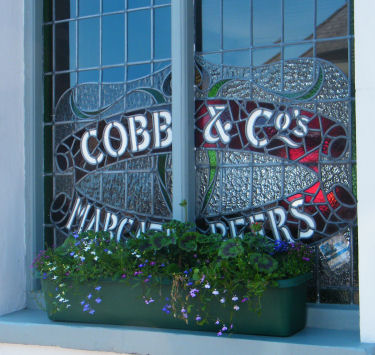 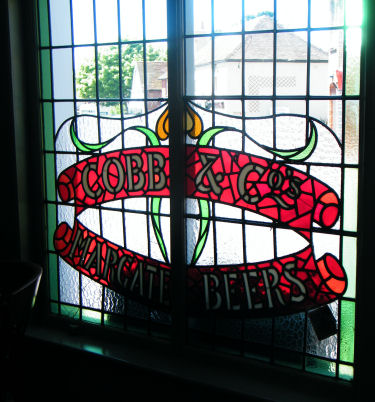
Above photos by Paul Skelton.
Photo left shows the window from the outside, and on the right from
the inside. Please note the image right has been flipped to allow easy
reading of the words "COBB & CO's MARGATE BEERS." |
|
Kentish Gazette, 24 July 1849.
ISLE OF THANET.
An inquest was held at the "New Inn," Minster, on the 11th inst., before
Mr. T. T. DeLasaux, and a respectable jury, on view of the
body of Thomas Knock, aged 65, who had been for many years an inmate of
the Isle of Thanet Union, and who was found dead in
his bed on the morning of the day in question. From the evidence of Mr.
Church, the governor, it appeared that deceased was
about as usual in his health the previous night, although much subject
to rheumatism, and upon another pauper going to call him
up, he was found quite dead. A verdict to that effect was returned.
|
|
Kentish Gazette, 28 August 1849.
MARRIAGE.
Holmans - Buddell. Aug. 23, at Minster, Thanet, Mr. Holmans, veterinary
surgeon, Briad Street, Canterbury, to Harriet, eldest daughter of Mr. E.
Buddell, "New Inn," Minster.
|
|
South Eastern Gazette, 10 July, 1860.
MINSTER (Thanet). Suspicious Death of a Man at the Union House.
On Thursday last, T. T. Delasaux, Esq., coroner, held an inquest at
the "New Inn," in this parish, touching the death of a travelling
tinker, known by the cognomen of "Charley" (but whose proper name is
at present unknown), supposed to have come from Dartford, who had
died under rather suspicious circumstances at the Isle of Thanet
Union-house.
Henry Horton, porter at the Isle of Thanet Union, deposed that on
the previous Monday evening the deceased was taken to the union
about a quarter before 6 o’clock in a fly, driven by a man named
Stephen Carter, of Ramsgate. Witness received him at the door of the
receiving ward, and placed him there on a bed. He was apparently in
a dying state, and within a quarter of an hour after admission he
expired. As soon as the deceased was admitted, witness sent for a
surgeon, but before he arrived the deceased was dead. Two men
accompanied the deceased in the fly.
George Thomas Good, a travelling coach trimmer, and lodging at St.
Lawrence, deposed that the deceased went to his lodging-house,
called the "Honeysuckle," on the previous Saturday, about 7 o’clock
in the evening, and slept there. He was then very poorly, but
perfectly sober. He continued very bad, and fell several times on
the floor, which witness believed was caused through weakness. The
deceased retired to bed between ten and eleven o'clock, but was
obliged to be carried there; and at that time witness believed that
he could neither hear nor speak. Witness and a companion of the
deceased, named Garnett, attended on the deceased during the
following day, and witness gave him some tea, a small quantity of
which, with difficulty, he swallowed. The deceased was removed to
the union as stated by the last witness, and he (Good) was one of
the men who went with him. Scratches were found on the back part of
the deceased’s neck, and which appeared to be of recent date.
Thomas Brief, or Ramsgate, relieving officer to the Isle of Thanet
Union, deposed that on Saturday night, between seven and eight
o’clock, and again about ten o’clock, a man (Garnett) went to his
house, and from his statement, witness went to Mr. Austen’s, a
surgeon, and they went and saw the deceased, who appeared to be in
great pain. Witness attended the deceased on Monday, and from his
condition, witness had him removed, by the direction of the surgeon
to the union. The surgeon stated, in the presence of a friend of the
deceased that he had been heavily drinking, and which that friend
readily admitted.
Mr. James Collyer, surgeon, of Minster, deposed that he was sent for
and attended the deceased at the union; he found him dead, but he
did not appear to have been so long. He examined the deceased
externally, and found one large bruise at the back of his neck and
several scratches on his chest, as if he had fallen on gravel; and
also some scratches round his neck. Witness made a post mortem
examination of the body on the previous day. He first opened the
head, and found the surface of the brain rather congested, the
substance of the brain healthy. On removing the brain, he found the
under surface covered with matter, and that portion of the brain
adjoining the spinal chord was surrounded with matter. He then
traced the spinal chord to the seat of the injury, and that was also
surrounded with matter. On opening the brain, the ventricles were
filled with fluid of a watery character. The presence of the water
and matter produced death.
At this stage of the proceedings, the inquiry was adjourned till
Monday, the 16th inst., for the production of the man (Garnett) with
whom the deceased had been drinking.
|
|
From the Kentish Gazette, 15 August 1865
Minster.bmp"
SHOCKING DEATH OF A RETIRED NAVAL OFFICER.
Yesterday Mr. Coroner Delasaux and a respectable jury held an
inquest, at the "New Inn," Minster, in the Isle of Thanet, on the
body of Octavius Nash Spong, late a Paymaster in the Royal Navy, on
half pay, who died under circumstances which will best be understood
from the evidence.
Mr. Superintendent Saunders, of the Margate Police Force, deposed
that he had known the deceased three or four years, during which
period he had resided at Margate. On Friday morning, about a quarter
to one o’clock he found the deceased lying on the ground in St.
James’s Square, Margate. It was then raining very hard and, with the
assistance of two young men, Mr. Saunders had him picked up. He was
very drunk and had marks of blood on his face and forehead. At the
request of the deceased Mr. Saunders had him conveyed to his own
house and saw his wife, who said, "Pray do not bring him here Mr.
Saunders, I am in danger of my life from him." Mr. Saunders then had
him removed to the police station.
At 12 o’clock on that day he was taken before the Borough
Magistrates on a charge of being drunk and incapable.
He was fined 5s. and costs, but the money was not paid. He was
however discharged, and left the Court in the direction of his home.
About half past one o’clock, Mr. Saunders was called and saw the
deceased lying on the floor of a coffee shop, bleeding from the
mouth. He was again, removed to the police station and Mr. Thornton,
surgeon, wis called in and examined him. There was a wound on the
back part of his head. He was then handed over to Mr. Pilcher, the
relieving officer, by whom he was taken to the Isle of Thanet Union,
his wife still refusing to receive him at her house.
Mr. Holloway, Master of the Union, said that when the deceased
was admitted into the Union he was put to bed. He called for "soda
water and six pennyworth of brandy." He did not then appear to be
very ill, but stupid. Two men were left to sit up with him on Friday
night. At three o’clock on Saturday morning he was called up, and on
going into the deceased’s room found he was then dead.
One of the two men who sat up with the deceased on Friday night,
described him as very tipsy and said he asked for lemonade, and
brandy during the night.
Mr. G. G. Phillips, surgeon, made a post mortem examination of
the deceased. There were two abrations of the forehead, and bruises
on different parts of the body. There were extravasations of blood
between the scalp and skull, corresponding with the external wounds,
which he believed were the cause of death.
The Coroner having summed up, the jury returned a verdict that
the deceased died from the effects of a fall while in a state of
intoxication.
|
|
Whitstable Times and Herne Bay Herald, 25 June 1870.
MINSTER. DESTRUCTIVE FIRE.
A destructive fire broke out on the grounds adjoining the "New Inn" in
this place on Wednesday evening. There was great scarcity of water, and
the fire, therefore, spread with considerable rapidity. The barn and
stable (7 stalls), which had thatched roofs, were quite destroyed; the
stable had only recently been erected. A small building adjoining the
stable and close to the house, was speedily removed, and this
precaution, in all probability, saved the house. The whole of the live
stock was also saved. A row of smaller boxes in the Tea Gardens, and at
the back of the stables were destroyed, and the flower beds much
trampled down. The Ramsgate Fire Brigade, under Mr. James Hake, was the
first upon the scene with their engine, which proved to be of little
use, on account of the scarcity of water, though several attempts were
made at neighbouring wells. But the men appeared to work with a will,
buckets of water from pumps, Ac., passing rapidly. We must here mention
the ancient Borough of Sandwich, for a fine body of men put in an
appearance from that town, with their engine, under the command of
Lieutenant G. Spain, and their foremen, Mr. G. Ralph. They arrived
within thirty minutes after receiving their telegram, and what is more
remarkable, this was the first time that they had been called to active
duty. Great praise is due to them for their great exertions. The barn,
stables, &c, were insured in the "Sun," the house, we understand, in the
"Phoenix." The following gentlemen, and many of the labourers residing
is the village, rendered great assistance:—Messrs. John Birch, sen.
(agent of the "Sun") B. Bubb, Golder, Woottoo, Ferrier, &c. It is stated
that the fire originated in water-closet, where some ashes from a pipe
had fallen. As usual the furniture was removed from the house
unnecessarily, and great damage resulted, though it is not surprising
there should have been anxiety to save portions of the goods.
|
|
Thanet Advertiser, Kent, England, 29 May 1875.
Local Intelligence.
???? charged with being drunk on licensed premises and refusing to quit
when requested to do so.
Defendant pleaded guilty.
Oswald Puckridge said:- I am a licensed victualler and and keep the "New
Inn," Minster, Thanet. The defendant was on my premises on Monday.....
|
|
Thanet Advertiser, Saturday 4 December 1875.
Wanted, a respectable young person, as General Servant.
Apply to Mrs. Puckeridge, New Inn, Minster.
|
|
Thanet Advertiser, Friday 22 May 1936.
MINSTER HAS MORE LUCK.
Extensions until 11 p.m. on Whit-Saturday and 11:30 p.m. on Whit-Monday
at the "Bell Inn," the "Freehold Inn," the "New Inn" and the "White
Horse," Minster, and the "New Inn," Monkton, were granted by Ramsgate
County magistrates on Tuesday.
|
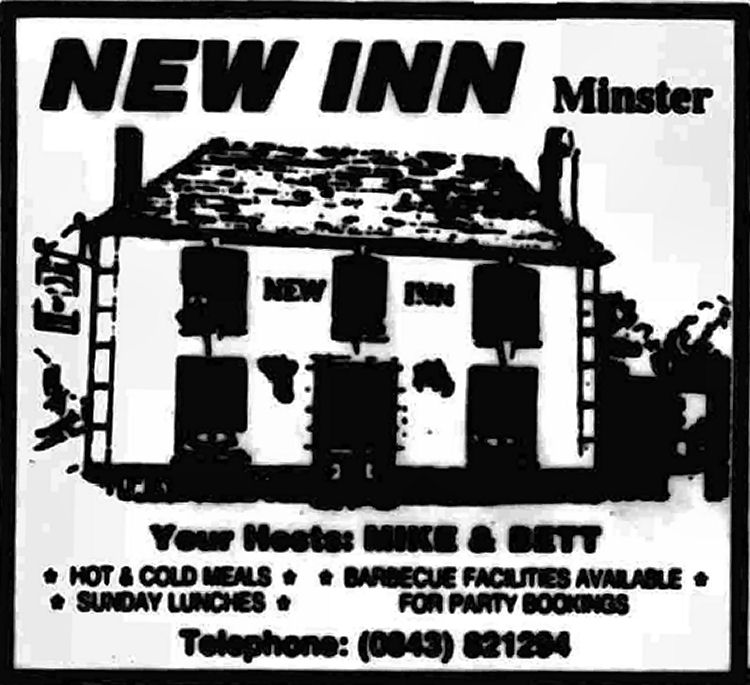
Above advert 1986. |
|
From an email received 22 December 2019. Your page about the New Inn
is very interesting, and contained in it is reference to licensee Oswald
Puckridge, 1874-75.
I like to post articles and found that a Jack The Ripper suspect
called Oswald Puckridge was registered as being born in Worthing. He was
actually born at Burpham a village near Arundel. He changed his name
from Puckeridge to Puckridge in later reports.
At the time of the second Ripper murder of Martha Tabram he had just
been released from a Lunatic Assylum. The first ripper murder may not
have been done by the same person. He was never a surgeon but at one
time was a Dispenser. I am attaching some details I compiled. Apparently
someone on the Ripper casebooks thinks that he has a very good alibi and
was dismissed by the Police from further investigations. He was a very
dangerous man and nearly killed another landlord in 1889. I hope you
find it all interesting. I saw reference to him painting the dogs in the
Party colours for the election.
During the time of the murders lots of letters were sent and that is
how they got the name Jack the Ripper. Puckridge said he was going to
rip someone up!
Regards,
Steve Bray. |
|
Leighton Buzzard Observer and Linsdale Gazette, Bedfordshire, England. 9th September 1884.
Mr. Oswald Puckridge, of Sandwich, full of political enthusiasm, dyed
his dog yellow, in which the poor animal, after prolonged yelling.....
|
|
Illustrated Police News, 6th July, 1889.
Murdererous Assault in the London Road.
Oswald, Buckridge, (sic) 50, described as a dispensing chemist, was charged
with violently assaulting Henry Frederick Orange by striking him on the
head with a gun. Police Constable 172M said about three o'clock on
Friday he heard cries of "Murder!" and "Police!" proceeding from York
Street, London Road. He ran quickly to the spot and outside the coffee
shop he found the prisoner surrounded by a crowd. Several persons were
holding the accused, and they told witness that he had murdered a man.
Witnessed went into the coffee shop and found the prosecutor Orange,
(who is the landlord) lying on the floor, bleeding profusely from a
wound in the head. In the presence of the prisoner the injured man said
the accused had hit him several times over the head with a gun. Witness
found the gun which was broken, at the back of the shop, and he took the
prisoner into custody. The injured man was taken to St. Thomas's
Hospital. He was able now to attend, the house surgeon stating that he
received a very serious injury to the head, the trigger having
penetrated the skull. In reply to the magistrate the prisoner said I
shall be able to prove that I only defending myself, and that an attempt
to rob me was made in the coffee shop. Mr. Slade remanded the accused
for a week but allowed bail.
|
|
Jack the Ripper. A suspect guide. By Christopher J Morley (2005.)
Oswald Puckridge.
On 19th of September 1888 Sir William Warren wrote to the Home
Secretary, Henry Matthews, and informed him of a suspect named Oswald
Puckridge, who had been released from an asylum on 4th August. Warren
wrote, "He was educated as a surgeon, and a threatened to rip people up
with a long knife, he is being looked for, but cannot be found yet."
Puckridge was born in Burpham near Arundel, Sussex, on 13th June 1838,
he was the fourth of five children, his father John Puckridge was a
farmer, his mother the daughter of a licensed victualler.
On 3rd of October 1868 he married Ellen Puddle at St. Paul's Parish
Church, Deptford and gave his occupation as chemist. In 1870 they had a
son Edward Buddle Puckridge. Oswald Puckridge was admitted to the Hoxton
house private lunatic asylum 50-52 Hoxton Street, Shoreditch, on January
6th 1888. On 9th August 1893 he was found wandering in Queen Victoria
Street, London, and was admitted to Bow Infirmary, he was discharged on
18th of August only to be readmitted on 5th February 1896, he was
discharged on the 14th February to the City of London lunatic asylum at
Stone, Buckinghamshire and was released on 9th July 1896, only to be
readmitted on 19th on August 1899. He was discharged once more on 18th
October before being admitted, on 28th of May 1900 to the Holborn
workhouse in City Road, where he gave his address as 34 St Johns Lane,
Clerkenwell, and his occupation as a general labourer. He died there on
1st June 1900 bronco pneumonia. There is no evidence to substantiate the
claim by Warren that Puckridge had ever trained as a surgeon, on his
marriage certificate is described as a pharmacological chemist.
|
|
From Jack the Ripper Suspects, by Paul Williams.
Lunatics.
This chapter considers the other lunatics suggested as Jack the Ripper.
On 19 September 1888, Sir Charles Warren wrote: “A man named Puckeridge
was released from an asylum on 4 August. He was educated as a surgeon -
has threatened to rip people up with a long knife. He is being looked
for but cannot be found as yet.”
Oswald Puckridge, sometimes spelt Puckeridge, was born on 13 June 1838
at Burpham in Sussex to John and Philadelphia (nee Holmes). He married
Ellen Buddel in 1868. The marriage certificate gives his occupation as
apothecary. The couple had a son. Edward, born in 1869, but separated
some time before the 1891 census.
As license of the "Railway Inn" in Deal, Puckridge appeared before
magistrates on a charge of opening his premises for the sale of alcohol
at 11:45 on Sunday, 29 September 1872, forty-five minutes before the
permitted time. Police Constable Seath gave evidence that Puckridge
admitted people with a train ticket. There followed a legal argument
about his right to do this. Railway passengers were exempt from the
licensing requirements and allowed to request alcohol if they so wished.
The court adjourned for a week, then decided that there was no evidence
to justify a conviction. Puckridge asked the bench if he could supply
refreshments to residents of Deal returning home by the last train on
Sunday nights. The magistrates were unable to give advice. The following
year, Puckridge obtained permission to remain open until 01:00 on the
morning of Friday, 10 January.
From 1874, he was license of the New Inn in Ramsgate. On 5 April 1880,
described as a retired publican, he was sentenced to six months' hard
labour at Ramsgate for causing the death of his dog. He had painted it
with the Liberal and Conservative colours, presumably for the general
election won by the Liberals. The dog was poisoned through licking the
paint off." Puckridge obtained bail, on appeal, but fled, it appears, to
Jersey. In August 1884, he was identified at Sandwich railway station on
a surreptitious visit to friends and returned to prison to serve his
sentence.
Later that year, under the name Oswald Fussell and described as a
student of medicine, he was charged with being drunk and disorderly and
using bad language. On 2 December 1884, he was preaching in Great Chapel
Street wearing a red jersey embroidered "Salvation Army” and hitting
people with his crutches. He was ordered to pav a fine or serve fourteen
days in jail."
Twenty days later, he appeared in the Jersey Police Court wearing a
Salvation Army uniform. He was charged with habitual drunkenness and
disorderly conduct and assaulting Mr. and Mrs. Lovett. He lodged in
three rooms owned by Mrs Lovett. On 20 December, he caused a disturbance
in the house and tried to kick the arresting police officer. He was well
known to the Jersey courts, having been ordered to give bail of £5 for
his future behaviour after an incident in the previous year.
The day after his release, he approached Phillip Journeaux with a sheep
and asked if he wanted to go drinking. Journeaux refused. Puckridge
knocked off his hat and kicked a hole in it. Puckridge claimed that he
had asked for assistance to move his furniture. He had a bag containing
a turkey, which he intended sending to the magistrate, a goose, which he
intended sending to Centenier Seymour, and a duck, which was a Christmas
present for someone else. The magistrate ordered him to give £10 bail
for future good and peaceable conduct and pay five shillings for the
value of Journeaux’s hat or spend fourteen days in prison.
He appeared before the same court on 17 October 1885 on charges of
insulting Albert Bernard Seymour. Puckridge lodged in a cottage with
Trossle Carus Best. Seymour, who rented a stable nearby, claimed that he
was unable to get his van out because of the conduct of the two men who
used foul language towards him. Seymour said that he had brought
Puckridge up before the courts before and had been receiving anonymous
letters ever since. Puckridge gave an eccentric speech, described as
usual for him by the newspaper. He said he had returned to the island to
create a tombstone to his mother and was collecting her tea cosy and
broom when he met Seymour who remarked that he had handcuffed him before
and would do so again. The magistrate said that Puckridge was a public
nuisance. He now had to pay his bail from his last appearance and agree
a sum of £5 for future good behaviour or go to jail for eight days. On
his next appearance, a report was ordered so that he could be sent to
his place of settlement. Alter leaving court, he was arrested by the St.
Helier police on another charge.
Puckridge was admitted to the Hoxton House lunatic asylum on 6 January
1888 as a pauper and released on 4 August 1888. Sir Charles Warren was
aware of this, but it is not known why he regarded Puckridge as a
surgeon.
In July 1889, Puckridge was charged with violent assault after hitting
Henry Frederick Orange on the head with a gun. The incident occurred in
a coffee house on York Street, London Road. Puckridge, described as a
dispensing chemist, claimed self-defence and that Orange had attempted
to rob him. Henry Frederick Orange appeared as a witness to a robbery at
a coffee shop in October the same year.
On 18 August 1893, the Morning Post reported that Puckridge, described
as an apothecary of 6 Stanhope Street, Huston Road, had been charged
with wandering, apparently of unsound mind. Ejected from the Salvation
Army barracks in Queen Victoria Street by Police Constable Crossingham,
he ran at a passing hansom cab and climbed on the horse's back. He was
taken, with difficulty, to the police station where Doctor Buncombe
certified his removal to Bow Infirmary. It appeared that drink and the
heat had affected him. Sergeant Mc’Vitty said that he known Puckridge
for several months. Puckridge was in the habit of wearing a naval
uniform and refusing to pay for hansom cabs. A lady claiming to be his
nurse said that she would take care of him and ensure that he avoided
alcohol. He was discharged with a caution on the understanding that he
would go back to his friends who, he said, were in Southampton.
Shortly afterwards, he was locked up on a charge of being disorderly and
assaulting the landlord of the Lord Nelson in Stanhope Street. Smoke was
seen coming from his cell and the police found his rug, pillow and part
of the woodwork alight. He could not explain how the fire started.
Previously he injured his head in a tramway accident and was still under
surgical treatment. He was returned to Bow Infirmary on 5 February 1896.
being discharged nine days later. He was then admitted to the City of
London lunatic asylum at Stone, recorded in the register of lunatics as
a danger to others, and released on 9 July 1896.
(Missing page)
In July, he was sent to Lambeth infirmary and, since August 15, lodged
at a coffee house in the Westminster Bridge Road. The keeper of the
house stated that the man had slept there every night since his arrival.
|
LICENSEE LIST
BUDDEL Edward 1837-71+ (age 70 in 1871 ) )

 PUCKRIDGE Oswald 1874-75+
PUCKRIDGE Oswald 1874-75+
WOTTON Mary A E 1881+
SOMERFIELD/SOMMERFORD William 1890-99+ (age 30 in 1891 ) )

FERRIER John Thomas 1901-07+ 
EASTON Joseph Henry 1911-13+ (age 56 in 1911 ) )
ATKINS William Richard 1918+
TAYLOR Walter F 1922+
FITCH John Fraser 1929-30+
FINCH Alfred 1930-Dec/1934

 
JAMES William J 1936-39
WILLISTONE Frank B 1939+
WHITE James Alfred 1951-55+
PALMER Edward 1957+
BARBER Edward 1970-76
MONKHOUSE Joseph Ronald 1976-84
HAYES Michael 1984-90
???? Gabi, Bill, Nick, Jeff & Lynn April/2011+
DEAN Ciaran 2016+
https://pubwiki.co.uk/NewInn.shtml
 From
Bagshaw Directory 1847 From
Bagshaw Directory 1847
 From
the Kelly's Directory 1899 From
the Kelly's Directory 1899
 From the Kelly's Directory 1903 From the Kelly's Directory 1903
 From
the Kelly's Directory 1934 From
the Kelly's Directory 1934
 Census Census
 From the Dover Express From the Dover Express
|






























